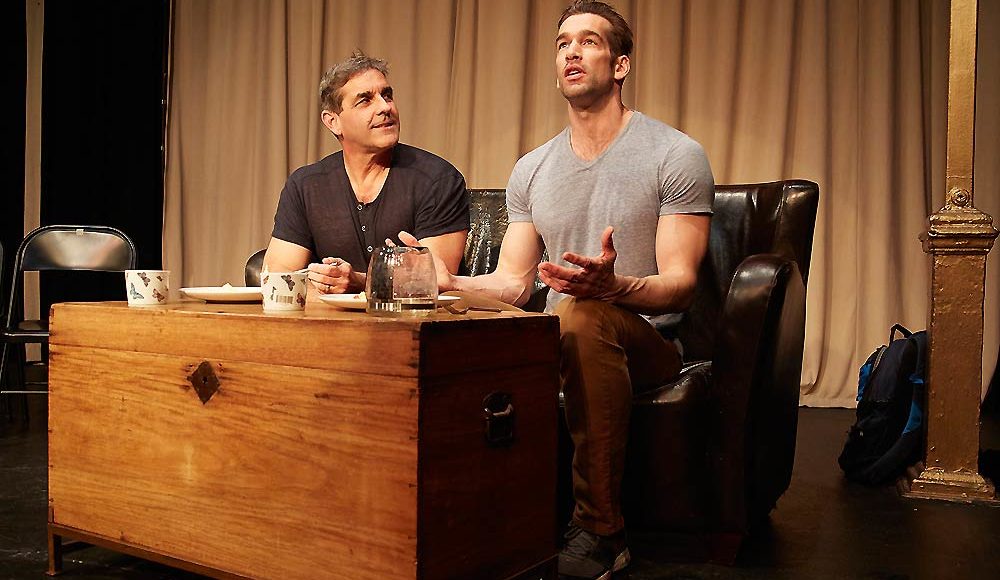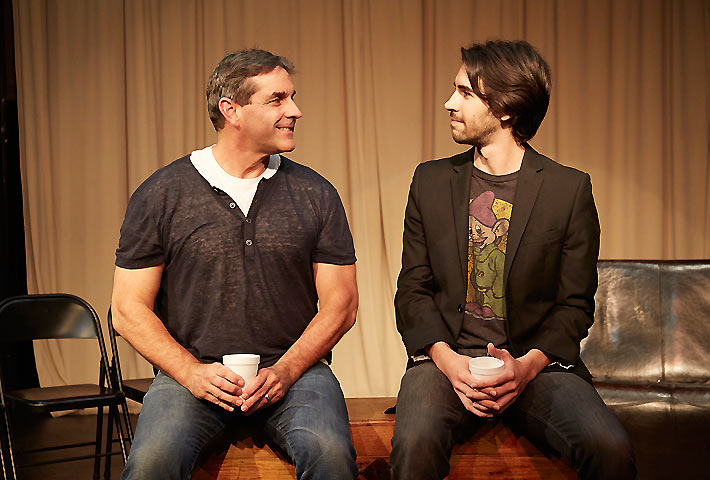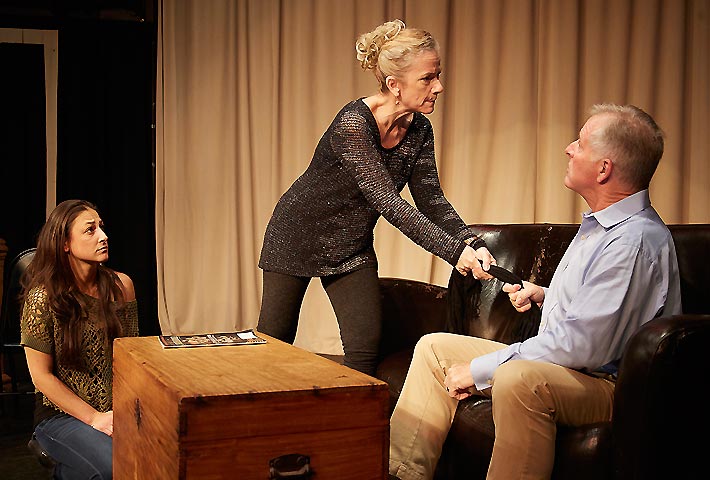Next Fall by Geoffrey Nauffts is a stunningly sincere and heartfelt drama that is sure to move any audience.
That may be an odd way to kick off a review, but when one leaves the Macha Theatre after the final bows are taken, what they will feel enveloped in, is the taut, honest humanity that permeates this little drama which was nominated for both a Tony and a Desk Award in 2010.
Adam (Jay Ayers) doesn’t believe his luck. I mean he really doesn’t believe it. Nor does he trust or have much confidence in it. That’s just his nature.
So when he falls into a relation with the much younger and much studlier Luke (Tom Berklund) he assesses it as a “bouncing Betty” in his life, and tensely waits for it all to blow up in his face.
As part of his ritual of “applied self-induced angst,” Adam must blind himself to the bliss they share and fixate instead on the one area of conflict the relationship holds.
And here Nauffts offers up a unique dramatic twist that distinguishes him as a playwright of note, in choosing to explore questions one generally doesn’t encounter in the LGBT theatre community or, for that matter, any other.
There are plenty of plays that place questions of faith at their center. At the center of Next Fall however, is something from which most playwrights would shrink: the questioning of faith in God, in ourselves, in those we love and even in our faith in not having faith in God.
For Luke is a character I don’t recall having seen portrayed on stage before; a very devout, very gay fundamentalist Christian. (And yes, such beasts do exist.)
Luke is accepting, both, of who he is and of the beliefs he holds from—I’m guessing here—a conservative Baptist upbringing. It is the very secular, very cerebral Adam who is troubled by Luke’s reverence for a religion that regards his lifestyle and, therefore, his love for Luke with the repugnance of righteousness.
Adam on the other hand dismisses the Bible, with herding animals on an ark and parting seas as “All just a little Vegas….”
Over the five years they are together, Adam continually assails Luke over his praying before meals, praying after sex, his belief in the rapture, but especially for the fact that he hasn’t come out to his parents.
Luke, as an attribute of adherence to his faith, is far more practiced in the art of focusing on what one has to be thankful for; while Adam, far more acutely aware of the irony in the situation between them observes, “You don’t have to believe in hell to walk around like you’re going to burn in it.”
Nauffts ups the dramatic ante when Luke is severely injured in a traffic accident. This serves to thrust Adam, along with Holly (Rachel Miles)—who’s New Age candle shop both men once worked at—and Luke’s erstwhile friend Brandon (John Shartzer)—another gay man and practicing Christian—into the fertile arena of a hospital waiting room. Cranking up the tension is the presence of Luke’s divorced parents, the flighty Arlene (Zachary Barton) and his very conservative father (Stephen Howard).
It is arguably a predictable device. By creative misdirection, including lobbing an audible chorus of a car crashing at us during the initial blackout, Nauffts smartly defuses this fact; by communicating it before the audience has its criticism-odometer even plugged in.
It, of course, helps that Nauffts’ dialogue is intelligent and engaging as are his actors, whose performances are, across the board, more than reason enough to recommend this piece.
If I were calling this review like a horse race, I might pronounce that Stephen Howard, as the aptly named Butch, manages to win the laurels by a nose, but because the entire ensemble consists of thoroughbreds, it would definitely be a photo finish.
The dark little secret all directors fear becoming common knowledge, is that casting correctly is about eighty-seven percent of the job.
Frankly I think if a director ever found himself with a 100 percent absolutely perfect cast, after the first table reading, he could just take long naps in the green room till opening night.*
Director Robin Long has a cast that if not 100 percent perfect ranks at least in the nineties. I was unable to discern her guidance of the actors as it’s not the type of play where you can pick that out easily. She certainly didn’t get in their way and that alone shows a director has sand.
There was noticeable laxness in choreographing the scene shifts, which come off rather maladroitly. And both the end of the first act and the play itself need to be tightened in order for the audience to recognize their arrival.
The darkest mark against her however, without elaborating too much, occurs near the play’s conclusion when a moment, in Luke’s hospital room, which should have had great impact, produces a pat at best.
Matt Walker weaves in some lovely music with an elegance that speaks of experience, complimented by Daniel Tator’s skillfully structured sound score.
The one feasible flaw with the production is a flaw I wish I could encounter more frequently, that is the brevity of the work. Nauffts provides the drama with a core of concision that is reflected in his characters and dialogue, but leaves both feeling to a degree somewhat truncated.
Understandably, in a piece that deals with the issues it does, the greatest threats are bombast and posturing; pitfalls Nauffts skillfully avoids.
Perhaps though, Nauffts has trimmed his sails a tad too tightly.
That the scenes could be expanded, and characters allowed more reins, only speaks to the merits of the work as is.
The title Next Fall—spoken on stage in reference to when Luke plans to come out to his parents—gathers additional connotations within the religious context, that suggests a fall from grace brought about by sin.
But if there is a fall within the spirit of the play, it is not that of the biblical Adam but the mythical Icarus.
A fall brought about not by disobience to an arbitrary commandment, but by that courage which allows us to soar above those that would deny us the freedom of flight.
There is a fall to be sought.
• Ron Sossi once told me that rehearsal was where you corrected the mistakes made in casting.
(Featured image: Jay Ayers, Tom Berklund — Photo by Zeke Ruelas)
Next Fall is in a Limited Run thru May 22
• Thursdays at 8 p.m.: May 12 and May 19
• Fridays at 8 p.m.: May 13 and May 20
• Saturdays at 8 p.m.: May 14 and May 21
• Sundays at 7 p.m.: May 15 and May 22
Macha Theatre
1107 N. Kings Road
West Hollywood CA 90069
For Tickets and Additional Information
800-838-3006 or www.nextfallweho.com






